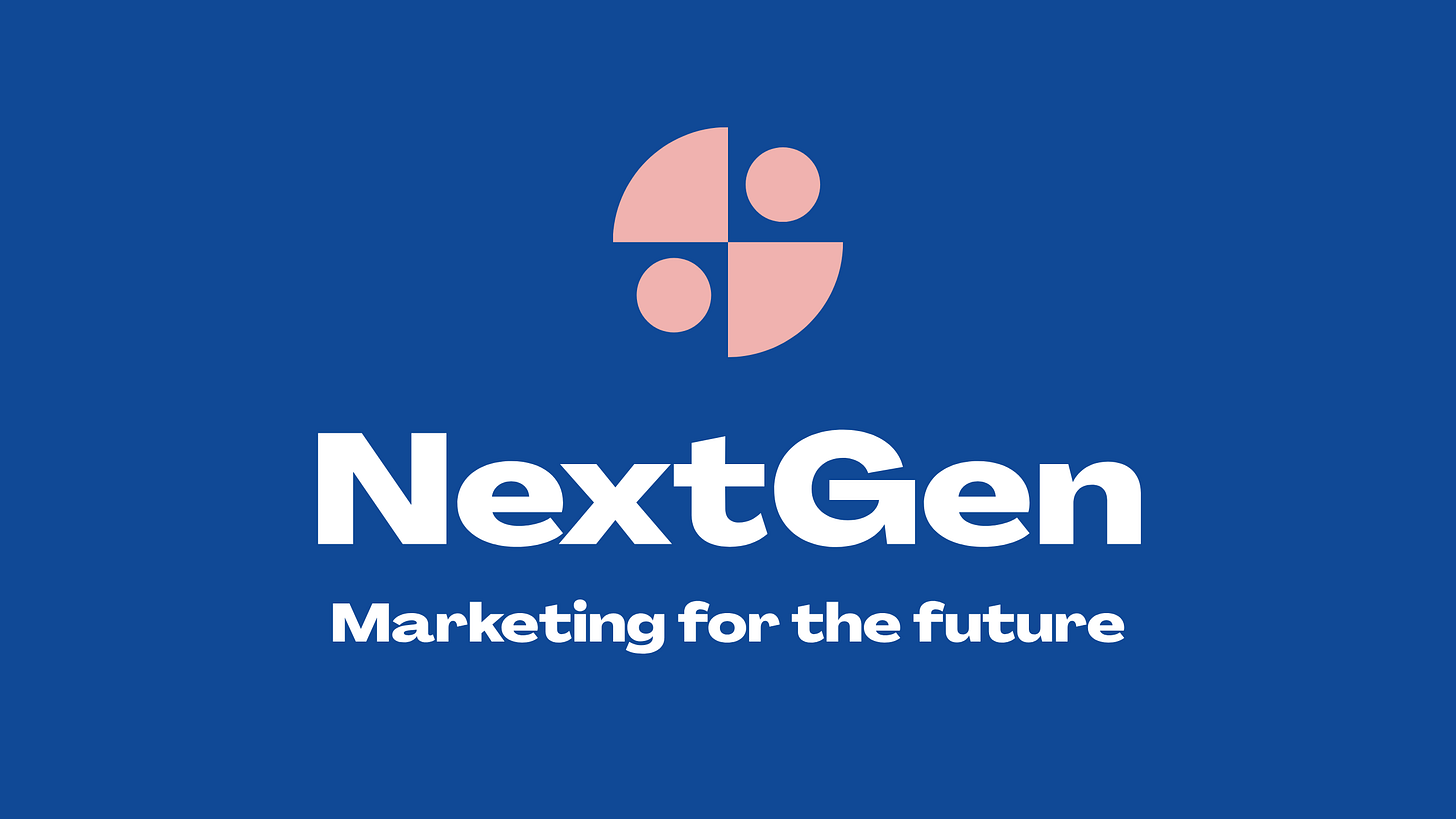How ex-Amazon executive Robin Burrowes is preparing the next generation of marketers for a disrupted profession
After 12 years at Amazon, Burrowes is building a consultancy to help marketers navigate an AI-transformed industry
Robin Burrowes spent 12 years at Amazon, long enough to see it morph from an online bookshop into one of the world’s most powerful companies. By early 2025, though, he’d had enough. The conversations about cuts were getting louder in Seattle, and the famous Amazon intensive working culture was starting to wear thin.
He left just in time. A few weeks later, Amazon announced it was cutting 14,000 jobs—the real number was probably closer to 30,000. AWS, which makes most of Amazon’s money, was hit hard. The cloud business was still massive, but it had lost ground to Microsoft and Google in AI. Burrowes watched from outside as former colleagues tried to hold onto their jobs.
Now he’s building something called Next Generation Marketer, a consultancy aimed at early and mid-career marketing professionals trying to navigate an industry being torn apart by artificial intelligence and other developments. It’s part coaching service, part online course provider, part attempt to work out what comes after a long corporate career.
Robin Burrowes, Former Amazon marketer and founder of NextGen marketing.
From Scottish breweries to Silicon Valley
Burrowes didn’t set out to become a marketing executive at tech giants. He studied at the University of Strathclyde and got his first marketing job at Tennent’s, the brewery, in the early 1990s. Marketing then was traditional: print ads, TV spots, campaigns that took months to plan.
The Internet changed everything. In 1999 and 2000, London was gripped by dotcom fever. He was working at HMV, the music retailer, and became fascinated by what the internet might mean for marketing. “
We’re having the same explosion of interest with AI right now,” he says, drawing the parallel.
That curiosity landed him a position at Microsoft in 2000. He started at MSN, then moved to Xbox in 2003. It was an odd choice—he wasn’t a gamer. But Xbox was trying to position itself as more than a console. It was building Xbox Live, an online gaming service that had about 100,000 subscribers when he arrived. By the time he left eight years later, it had 10 million.
The Xbox years
The growth was impressive, but Burrowes’s real achievement was repositioning Xbox Live from a gaming-only platform into what he calls “a broader lifestyle” service. He brought in music videos and films, integrated social media, and pushed hard on retail partnerships with shops like Game and Gamestation.
Between 2005 and 2010, broadband adoption exploded. Games like Halo and Call of Duty stopped being solo experiences and became multiplayer phenomena. Xbox Live positioned itself as the best platform for this. Burrowes made sure people knew about it.
“I introduced music videos, I introduced movies, we introduced social media,” he says. “We did a lot of influencer stuff at the time.” Most importantly, he drove Xbox Live’s presence at retail, making sure shop staff were incentivised and that stock was available. Mental availability plus physical availability—the basics still mattered.
Twelve years at Amazon
In 2012, Burrowes moved to America to join Amazon. The company was just starting to take entertainment seriously. Prime Video was in its infancy, the music service was nothing special, and Twitch hadn’t yet been acquired. For someone with his background, the job made sense.
He stayed 12 years because Amazon kept expanding. He worked on Amazon Music, helping launch the full subscription service in 2016 to compete with Apple and Spotify. The rollout of Alexa and Echo devices gave Amazon a massive advantage being the default music service on those speakers was, in his words, “rocket fuel” for subscriber growth. Zero to five million subscribers in year one, tens of millions by the time he moved on.
Then he went to IMDb, where the challenge was different. IMDb was known for answering “Who starred in that film?” but Burrowes wanted it to answer, “What should I watch tonight?” As streaming services multiplied and choice paralysis set in, IMDb’s data and authority could help people navigate the mess.
One of his bigger bets was integrating TikTok with IMDb. He started pushing for it in 2020, seeing that IMDb’s ageing audience needed refreshing in a category dominated by Gen Z and millennials. US-China tensions delayed things, but when the integration finally launched in 2022-23, it brought in about 1.5 million new customers a year.
The scale of Amazon’s cuts became clearer in the months after Burrowes left. The official figure of 14,000 redundancies was, by January, widely understood to be closer to 30,000. AWS bore the brunt awkward given it’s Amazon’s main profit engine. The logic was straightforward enough: shedding 30,000 staff would free up cash to chase down Microsoft and Google in AI, a race where Amazon had fallen conspicuously behind.
There’s also the longer-term issue of warehouse automation. Amazon employs hundreds of thousands of warehouse workers doing jobs that resemble factory work. Those jobs are disappearing. “If you can whisper to robots and fix them when they malfunction, life’s good,” Burrowes says. “If you’re not a robot whisperer, better find another job.”
Life after Amazon
Burrowes is now running Next Generation Marketer, targeting people with five to ten years of experience who want to move into senior roles. He does one-on-one coaching, though that’s limited by time. He’s developing online courses through a platform called Maven and mentoring students at Seattle University, where he’s on the marketing board.
The business model is still taking shape. He’s keeping some traditional consulting work—helping companies solve growth problems—to pay the bills. But he’s also experimenting with scalable stuff: courses, mentoring programmes, things that don’t require him to be on Zoom calls all day.
“I was mentoring a lot of up-and-coming marketers at Amazon,” he says. “I was also enjoying becoming an Amazon bar raiser”—that’s someone who interviews candidates. “That consultancy, advisory capacity was starting to become a bigger part of what I was doing anyway.”
It’s the classic consultant’s problem: trading time for money versus building products that generate income while you sleep. He’s trying to do both.
Building teams at Amazon
Throughout his corporate career, Burrowes got good at expanding his remit. His strategy was simple: show that the opportunity is bigger than one person can handle, then nag relentlessly for more resources. He’d write documents, “harass leaders and team champions,” and frame everything around ROI. “If you give me more people, I will give you more growth.”
It worked. Marketing is often under-resourced compared to engineering or product development, but Burrowes knew how to make the case. Every team he built—at Microsoft, at Amazon Music, at IMDb—started with quantifying the opportunity and writing business cases. It’s a skill he now teaches his consultancy clients.
What AI means for marketing
Burrowes’s views on AI are more nuanced than most. “I embrace AI more than I fear it,” he says. “But I also embrace that the best and smartest, foundational marketers are the ones that are going to benefit most.” Random people jumping on ChatGPT won’t suddenly become marketing superstars, though it might help in certain areas.
He breaks down AI’s impact into three areas. At the front end, creative development is becoming “Photoshop on steroids.” Lots of people will learn to make creative assets faster, but that doesn’t mean better. Effectiveness still matters more than speed.
In the middle, media management is being automated rapidly. Every big tech platform now has some version of “performance plus” algorithms that optimise ad spend in real time. Media buyers who manually adjust campaigns are going the way of travel agents.
At the back end, measurement and analytics are becoming more autonomous. The ability to connect inputs to outputs—to know which marketing activities drive which results—is getting easier. AI can test and iterate faster than any human.
The human cost is real. “You might not need as many humans turning those wheels anymore,” he says. But he doesn’t think it’s mass unemployment, at least not yet. “The output for individuals is just going to increase. Initially, for marketers, I think it’s a case of doing more and peddling quicker rather than not peddling at all.”
Desktop publishing didn’t eliminate designers but raised productivity expectations. The difference now is speed. What took the internet a decade might take AI a fraction of that time.
The marketing paradox
There’s an irony in what Burrowes is doing. As a friend at TikTok pointed out, marketers are brilliant at promoting other people’s products but terrible at marketing themselves. The friend calls it “the marketable marketer” problem.
The exceptions prove the rule. Mark Ritson, Rory Sutherland, Scott Galloway—they’ve all mastered self-promotion without losing credibility. Ritson’s Australian bluntness, Sutherland’s eccentric erudition, Galloway’s contrarian style. They’re personalities as much as experts.
Burrowes is more cautious. His consultancy’s social media presence is growing but modest. He’s experimenting with Maven and writing newsletters. It’s early days, and he’s learning as he goes—much like he learned paid media at Amazon by jumping in.
Going niche
A recurring theme is specialisation. Burrowes is resisting the temptation to help everyone. Early-to-mid-career marketers making the jump to senior roles—that’s his focus.
It reflects a broader trend in professional services. As information becomes free (or AI-generated), the value shifts to curation and customisation. Generic advice has limited worth; specific guidance commands premium pricing.
What comes next
Looking ahead, Burrowes sees marketing dividing not by traditional specialisms—brand versus performance, creative versus analytical—but by adaptability. Those who use AI as a productivity tool will do fine. Those who resist will struggle.
The division won’t happen gradually. When AI capabilities cross certain thresholds, organisations will reorganise fast. It’s happened before with other tech disruptions desktop publishing, digital marketing. The AI revolution will follow the same pattern, just faster.
For him, the opportunity is helping marketers navigate this. At Amazon, he had to learn paid media strategy from scratch, an area where he had no expertise. He did it by jumping in. That’s the growth mindset he’s trying to teach—yes, AI will eliminate some jobs, but it’ll create new ones requiring different skills.
The foundational principles of marketing—understanding customer psychology, building brands, measuring effectiveness—don’t change. AI accelerates execution and enables real-time optimisation, but it can’t replace strategic thinking. At least not yet.
Whether Next Generation Marketer becomes a substantial business or stays a portfolio of projects, Burrowes seems more interested in helping people navigate their careers than building an empire. He’s lived through the internet’s birth, the mobile explosion, social media, the streaming wars. He’s adapted each time.
That experience, passed on to people still working it out, might matter more than any individual consulting engagement. In an industry obsessed with youth and novelty, someone insisting that experience counts is almost subversive.
You can contact Robin by clicking one of the links below.
Email , LinkedIn, Maven course: 11/07 , Private 1:1 coaching
Thanks for reading all the way to the end of the article! This post is public so feel free to share it, and if you have not done so already sign up and become a member.





